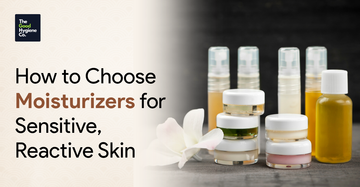I moisturise regularly. But my sensitive skin still feels dry, tight, and irritated. Why? You’re doing everything right — cleansing gently, moisturising twice daily. Yet your sensitive skin still flares up with dryness, tightness, or stinging? You’re not alone.
This is a common experience among people with sensitive skin, especially when the moisturiser isn’t formulated specifically for skin that’s reactive, inflamed, or easily irritated. Let’s break down why this happens, and what to look for in a moisturiser for sensitive skin.
What is Sensitive, Reactive Skin?
Sensitive skin is a condition where the skin overreacts to environmental, physical, or chemical triggers. Common signs include stinging, burning, itching, tightness, redness, or dryness even in response to products that are labeled “gentle.” Reactive skin may also flare up due to stress, temperature changes, pollution, hormonal shifts, or dietary triggers.
Underlying most cases of sensitive skin is a weakened skin barrier. When the barrier, your skin's natural protective shield is compromised, it loses moisture easily and allows irritants in, setting off inflammation and discomfort.
That’s where the right moisturizer becomes critical.
Why regular moisturisers don’t always work for sensitive skin
Most general moisturisers focus on hydration. But sensitive skin needs more than just water-binding ingredients — it needs help calming inflammation, restoring the skin barrier, and preventing irritants from getting in.(1)
Many creams also contain potential irritants like fragrance, essential oils, alcohol, and strong actives — which might be fine for normal skin, but for sensitive skin, they can be a disaster.
If your skin feels:
- Itchy, red, or stingy after applying moisturiser
- Dry despite frequent application
- Flushed or blotchy after sun, wind, or stress
…it’s likely you’re using something that’s not quite right for sensitive skin.
What sensitive skin actually needs from a moisturiser
For sensitive skin, your moisturiser must do three things:
1. Rebuild your skin barrier
The skin barrier of your skin’s outermost defense layer is often compromised in sensitive skin, which lets in allergens, pollution, and irritants. Look for moisturisers with:
- Ceramides: Help fill the gaps in a damaged skin barrier
- Fatty acids and cholesterol: Restore lost lipids
- Squalane or shea butter: Mimic natural skin oils
2. Calm inflammation
The hallmark of sensitive skin is underlying inflammation. Redness, burning, and stinging all point to this. That’s why moisturisers should include soothing agents (see below) that actively reduce inflammation.(2)
3. Hydrate gently
Hydration is still key but in a non-irritating way. Look for:
- Glycerin: A gentle humectant that draws moisture without triggering sensitivity.
- Panthenol (Vitamin B5): Hydrates while supporting skin healing.
- Aloe vera: Cools and calms stressed skin.
Soothing agents that make a difference in sensitive skin moisturisers
Sensitive skin isn’t just dry — it’s inflamed. That’s why moisturisers for sensitive skin should include botanical soothing agents that calm reactivity and reduce visible redness. Some of the best include:
Chamomile Extract:
Rich in bisabolol and flavonoids, chamomile has powerful anti-inflammatory properties. It helps reduce itching, redness, and swelling in sensitive skin, especially during flare-ups.
Calendula:
Known for its wound-healing and skin-calming effects, calendula is a gentle herb that supports the repair of damaged skin while easing irritation. Perfect for post-sun, windburned, or reactive skin.
Colloidal Oatmeal or Oat Extract:
A superstar for eczema-prone and sensitive skin, oat extract soothes itching, strengthens the skin barrier, and provides antioxidant benefits. It forms a calming, protective film over the skin.
Aloe Vera:
Offers cooling, hydrating, and anti-inflammatory benefits — ideal for red or reactive sensitive skin. Just make sure the formula is free of irritating preservatives or alcohol.
Panthenol (Pro-Vitamin B5):
Not a plant extract but highly effective — it hydrates and supports healing while reducing irritation and dryness in sensitive skin.
What to avoid in sensitive skin moisturisers
Some ingredients can silently sabotage your skincare efforts. If you have sensitive skin, steer clear of:
- Fragrance or parfum: The #1 cause of cosmetic irritation
- Essential oils (like lavender, citrus, tea tree): Natural doesn’t always mean gentle
- Alcohol denat: Dries out and weakens your skin barrier
- Strong actives: Retinoids, AHAs, or vitamin C can cause stinging unless specifically formulated for sensitive skin
- Overly thick or greasy textures: These can clog pores and trap heat in irritated skin
Choose minimalist, barrier-repairing formulas
When in doubt, simpler is better. For sensitive skin, minimalist formulations with under 10–15 ingredients are often the safest. A good moisturiser for sensitive skin should prioritise barrier repair, inflammation control, and gentle hydration — not complicated claims. The good Hygiene Comapny has come up with Go Gently range of moisturisers for sensitive skin. They are safe to use.
Look for terms like:
- “Dermatologist-tested for sensitive skin”
- “Fragrance-free”
- “Non-comedogenic”
- “Hypoallergenic”
How to Use a Moisturizer on Sensitive Skin
- Apply on damp skin — right after cleansing or a bath to lock in moisture.
- Use clean hands or a spatula — to prevent contamination.
- Patch test new products — always. Apply a small amount behind the ear or on the inner arm and wait 24–48 hours.
- Layer correctly — if using actives (like prescription topicals), always finish with your moisturizer to seal and protect.
- Use consistently — at least twice daily, and more frequently during flare-ups or dry weather.
Best Types of Moisturizers for Sensitive Skin
Lotions and Lightweight Creams
Ideal for oily or combination sensitive skin. They hydrate without clogging pores or feeling greasy.
Barrier Creams
Thicker than lotions, these are great for dry, reactive skin that needs both hydration and protection. Look for ceramide-rich creams that mimic the skin’s natural lipid structure.
Gel-Based Moisturizers
Good for humid climates or oily yet sensitive skin. Ensure they’re alcohol-free and contain calming agents like aloe or panthenol.
Balm or Ointment (Selective Use)
For very dry, chapped skin or areas like lips, cheeks, or hands during winter and also for cracked foot. Choose petrolatum-based ointments free from lanolin and fragrances.
Conclusion:
Sensitive skin demands more than just any moisturizer it needs the right one. The goal is not just to hydrate, but to soothe inflammation, restore the barrier, and protect against future triggers.
By choosing moisturizers designed specifically for sensitive skin those that are fragrance-free, barrier-repairing, and dermatologically tested you give your skin the best chance to stay calm, and comfortable.
References:
1. Moisturizers: The Slippery Road - 2016 May - https://pmc.ncbi.nlm.nih.gov/articles/PMC4885180/#sec1-6
2. Moisturizer in Patients with Inflammatory Skin Diseases - 2022 Jul - https://pmc.ncbi.nlm.nih.gov/articles/PMC9315586/#sec1-medicina-58-00888
3. Clinical Perspective: Moisturizers vs. Barrier Repair in the Management of Atopic Dermatitis - 2018 Aug - https://pmc.ncbi.nlm.nih.gov/articles/PMC6289688/






